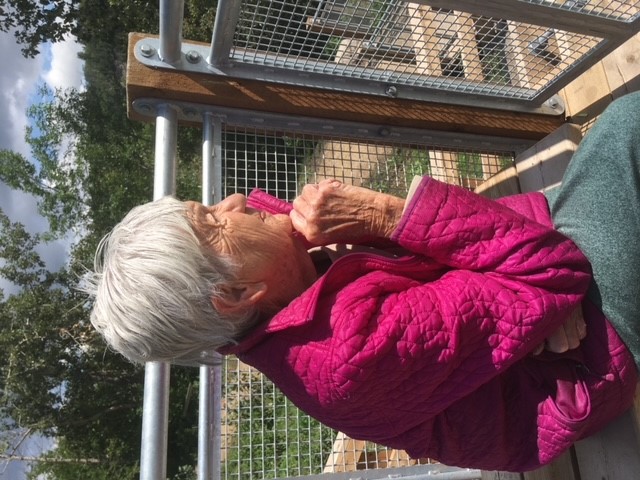Planning for the unexpected
Prepare for what you want your life — and end of life — to look like

October 12, 2021
By Ben Freeland, communications advisor, Covenant Health
Editor’s note (December 2025): This story reflects information accurate at the time of publication. Amanda Brisebois no longer holds the position of medical director at Covenant Health's Palliative Institute.
Sheer luck. This is the way David Schneider describes how he came to know what his 91-year-old mother's final wishes were as she unexpectedly entered the final week of her life.
On a July afternoon when COVID-19 restrictions had eased slightly, David and his sister arrived at their mother’s home to find her collapsed and unconscious on the floor. Paramedics took Joan Schneider to the Grey Nuns Community Hospital, where an exam revealed a large internal brain injury from which she would likely never recover. From the hospital, David’s sister asked him and his other siblings if they knew anything about their mother’s wishes regarding medical efforts to prolong her life.
“I was able to recall one casual conversation that I had had with her many years previous, when she made it very clear that she did not want any kind of extraordinary care in the hospital,” David explains.
“It was a half-joking conversation, but it made all the difference to her quality of life at the end. I shared that conversation with my sister, and the hospital transferred her to the palliative care unit, where she died peacefully one week later. Had we not had that conversation, she might still be on life support today.”
For David, a retired former communications manager with the Edmonton Police Service who is currently working as a part-time communications consultant with Covenant Health’s Palliative Institute, the experience was a wake-up call to the importance of palliative care awareness and advance care planning.
“Prior to this, I had no knowledge of palliative care. Even as they took my mother to the unit, I really had no idea what palliative care entailed, and it was only after being there for several days that I came to understand what it was,” he says.
Despite the fact that more than half of Canadians now report having had someone receive palliative care within the last 10 years, a 2016 Ipsos poll revealed that 42 per cent of Canadians were unfamiliar with palliative care, while less than half of Canadian adults (43 per cent) reported having had conversations regarding their palliative care preferences.
Palliative care is defined by the World Health Organization as an approach to health care that improves the quality of life of patients and their families who are facing problems associated with life-threatening illness through early identification, correct assessment and treatment of pain and other problems, whether physical, psychosocial or spiritual. It can begin as soon as someone is diagnosed with a life-limiting illness, such as heart disease or diabetes.
Part of palliative care includes advance care planning, a way to help a person plan and document their wishes for the type of health care they want now and in the future. Through this process, a person would consider their values and wishes for medical treatments and talk about their healthcare goals with their healthcare providers and their family. An awareness of palliative care can support decision-making during the advance care planning process.
“Palliative care and advance care planning are about enabling people to live their best possible life in a way that aligns with their values at any point between a diagnosis and a person’s final days or hours,” says Dr. Amanda Brisebois, medical director of Covenant Health’s Palliative Institute.
“Not everybody wants to carry on living while unable to think properly or take care of their physical needs. These decisions are extremely personal and are informed both by culture and individual preferences. People need to think carefully about what their preferences would be should the unexpected occur and clearly communicate this information to somebody they trust to speak on their behalf. And for this, people need to know the kind of care that is available.”
David is confident that he made the right call in his mother’s case but adds that the way the decision was made was far from ideal.
“Had I known more, I would have been able to have further discussions with my mother to make sure we were all clear on what her final wishes were. Instead, we were reliant on me and my memory of a conversation that had been had many years prior.”

Joan Schneider
David's mother was fortunate to be able to live her last remaining week in great comfort.
“The care was extraordinary. The nurses and other staff on the unit went out of their way to provide her with great care focused on her comfort, even though the entire hospital was in the midst of COVID protocols and restrictions. Their efforts made a lasting impression on my family.”
David’s experience stewarding his mother’s final days has prompted him to engage in more formal end-of-life discussions with his wife and children, with the story serving as a perfect illustration of the importance of such conversations. He also encourages others to do the same.
“I would look for a natural opportunity to bring the subject up,” he says. “If a friend has a serious illness or accident, or somebody famous dies, that’s an opportunity to have a conversation.
“People need to know what kind of care is available for end of life. Everybody deserves the sort of comfort my mother had in her last week of life, and getting that type of care shouldn’t be left to chance.”
World Hospice and Palliative Care Day is marked on October 9. You can read more about it on the World Hospice Palliative Care Alliance website.